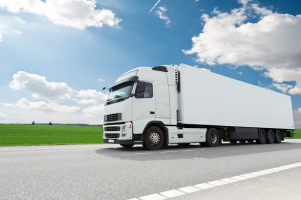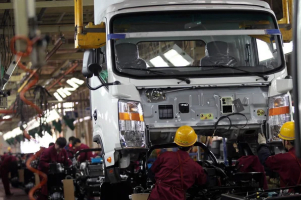
Truck accidents may lead to severe injuries and significant property damage. Determining liability involves a thorough investigation and can often be complex due to the multiple parties involved. These could entail the truck driver, the trucking company, the vehicle or parts manufacturer, cargo loaders, and even government agencies or contractors.
At Ryan LLP, we stand up for people involved in commercial truck accidents. We understand that truck accident liability can be complicated, but our experienced truck accident attorney can defend your rights if you have been implicated in a commercial truck accident. Explore the details of our services below, and contact us to book a free consultation.
[ez-toc]
An experienced truck accident lawyer, like those at Ryan LLP, can make a significant difference in your case. They can conduct a thorough investigation, gather evidence, consult experts, and help you navigate through the complexities of truck accident law. They can also handle negotiations with insurance companies as your representative and advocate for your rights in court if necessary.
In any given truck accident, a multitude of parties could potentially be involved, each playing a unique role in the incident. In addition to the truck accident victim, the truck driver, trucking company, manufacturing company, maintenance professionals, and even the government could all have legal responsibility. Sorting through this network is a crucial part of any truck accident claim.

Truck drivers are vital in transportation operations, controlling the vehicle's every move. As such, their actions can directly influence the outcome of a journey. For instance, if a truck driver opts to speed up to meet a tight delivery schedule, their reckless behavior can cause a severe accident.
Similarly, distracted driving, such as texting while at the wheel, can lead to late reactions to roadway events and subsequently cause a collision. Violating Hours of Service regulations — rules set by the Federal Motor Carrier Safety Administration (FMCSA) that restrict the maximum number of consecutive hours a driver can operate a truck — can result in fatigue-induced accidents. Proving these forms of truck driver negligence often requires an in-depth look into the driver's logbook, electronic onboard recorder data, and witness statements.
The trucking company, being the employer of the driver and the entity responsible for managing the truck's operations, can also be held accountable. If the company failed to carry out its due diligence in its hiring process, it could employ unqualified or risky drivers, leading to preventable accidents.
Additionally, if they neglect to provide comprehensive training or fail to supervise their drivers effectively, they can be held legally accountable for any ensuing accidents. It's also not uncommon for some companies to implicitly or explicitly encourage their drivers to violate safety regulations, such as speed limits or service hours, to meet demanding deadlines. Encouraging negligent truck driver behavior can directly contribute to accidents.

Manufacturers and parts suppliers also play crucial roles in the safety of a truck's operation. Suppose a truck accident is caused by a defect in the vehicle or a component part that should have been caught during quality assurance tests. In that case, the manufacturer or supplier can be held liable under product liability law.
For instance, defects in critical systems such as the truck's brakes, tires, or steering system could directly lead to catastrophic accidents. If a faulty brake system fails to stop the truck at a crucial moment or if a tire blows out due to a manufacturing defect, the responsibility could fall on the manufacturer or the supplier of the faulty parts.
The process of loading and securing cargo is a pivotal step in the safety of truck operations. Cargo loaders or securement companies can be held liable if improperly loaded or secured cargo leads to an accident. For example, if cargo shifts significantly during transport due to inadequate securement, it can cause the truck to become unstable and tip over.

Lastly, government agencies and contractors are responsible for ensuring safe and navigable road conditions. They can be held liable if poor road conditions, inadequate signage, or negligently performed road repairs contribute to a truck accident.
For example, if a road surface's degradation has been reported and overlooked, leading to an accident, the agency responsible for its maintenance could be held accountable. Similarly, contractors responsible for road construction or maintenance could be liable if their negligent work results in dangerous conditions causing an accident.
When it comes to determining accountability in a truck accident, there are several key factors that investigators and legal professionals will consider. They include:
The cornerstone of many personal injury cases, negligence, is critical in determining liability in truck accidents. To establish negligence, it is necessary to show that the defendant (the party being accused) owed a duty of care to the plaintiff (the accident victim).
The next step is to establish that this duty was breached. For example, a truck driver might breach their duty of care by driving while fatigued or under the influence of alcohol or drugs. A trucking company might breach its duty by neglecting necessary vehicle maintenance.
Finally, it must be proven that this breach of duty directly resulted in the plaintiff's injuries. For example, if a truck driver fell asleep at the wheel and caused an accident, it could be argued that the driver's negligence in managing their fatigue led to the collision and subsequent injuries.
Both federal and state regulations provide a structured framework to ensure safety in the trucking industry. These rules, such as those established by the Federal Motor Carrier Safety Administration (FMCSA), encompass everything from driver conduct to vehicle maintenance and cargo loading. Violations of these rules can provide strong evidence of negligence.
For example, suppose a truck driver violates Hours of Service regulations — which restricts the number of consecutive hours a driver can operate a commercial vehicle — and causes an accident due to fatigue. In that case, this violation can be used to establish liability. Similarly, if a trucking company fails to adhere to vehicle maintenance requirements or a cargo loading company doesn't follow cargo securement rules, leading to an accident, these violations can also be crucial in determining liability.
A detailed examination of the truck driver's conduct leading up to and during the accident is crucial in establishing liability. Unsafe driving behaviors like speeding, distracted driving, impaired driving, or aggressive driving can all contribute to accidents and serve as indicators of negligence.
Our legal team can collect evidence and information from numerous sources, including traffic camera footage, eyewitness accounts, the driver's own statements, data from onboard electronic logging devices, and even the accident scene itself. Rely on our experience to help you.
The truck's physical condition at the time of the accident is another significant factor in determining liability. This includes issues like brake failure, tire blowouts, steering system failure, lighting defects, or other mechanical troubles that might have contributed to the accident. These can result from improper or inadequate maintenance by the trucking company or defects from the vehicle manufacturer or parts supplier.
For example, if we discover that the trucking company skipped scheduled maintenance checks, the company could be held liable. Or, if a new truck suffers a critical system failure due to a manufacturing defect, the vehicle manufacturer could be held responsible. You never know whether these factors could have contributed to your accident and injuries, which is why this detailed investigation is so important.

There are other aspects to consider following a truck accident. A few additional factors that might play a role in determining fault include:
Truck drivers and trucking companies must carry certain minimum levels of liability insurance, which are set based on the type and weight of the truck and the type of cargo it transports. This insurance is meant to provide compensation for people who are injured or property that is damaged in a truck accident.
If your damages exceed the liability limit of the insurance policy, then we may pursue a claim against the truck driver, company, and any other liable parties directly.
If you've sustained an injury in a truck accident, you may be able to obtain various types of damages. Economic damages include medical expenses, lost wages, and property damage. Non-economic damages include pain and suffering, future wages, and potential loss of consortium.
If the defendant's conduct was exceedingly egregious, we may pursue punitive damages, which can significantly increase the value of your claim.

If you or a loved one has been injured in a truck accident, Don't hold back from reaching out to the experienced truck accident attorneys at Ryan LLP. We offer an initial case consultation and can help you understand your rights and options. Our primary goal is to protect your rights and defend your interests, so give us a call today to schedule a free case consultation.